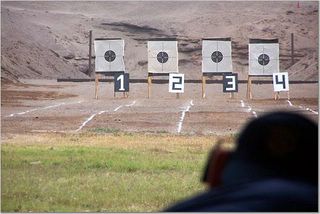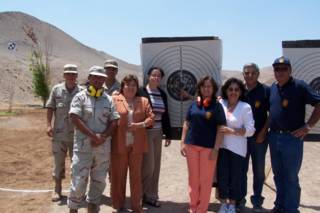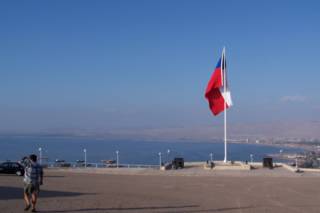Arica- Hitting the Bullseye and Finding Independence
Arica lies on the northern border of Chile, right next to Peru and is also about an hour away from Bolivia by paved road. I arrived here at 7am by bus on Saturday morning and a local Rotarian picked me up and brought me to her house. I took a quick shower and ate half of my breakfast before we hurried out to the final activity of the Rotary-Lions Club Olympics at the military base. The final game? Target shooting!
At the shooting range
Now I´m no pro with rifles (given that I´ve shot twice in my life with my dad, a life long member of the NRA)- but I´m not too bad either... It must run in the blood though because after the clubs finished up the competition, the "ladies" got to "try"- and boy did my marks surpirise everyone there! Each of us got three shots-I marked a 10, a 9, and an 8. Not bad for a lady, huh? If I would have had the full 10 shots that the participants got, I am sure I would have placed in the top 3. Thanks for the training dad!

Rotarians, Military, me with my 10, 9, and 8
Finding Imdependence
Historically, relations between Chile, Peru, and Bolivia have been pretty rocky. About 125 years ago, Chile won the War of Independence and received the ceded land that now strectches between Antofogasta and Arica. The most important- Bolivia ended up without access to the sea and, accordingly, without a port to import and export products. To this day, Bolivia is trying to get back what they gave away.
Arica has two "ports"- one is occupied by Chile and the other actually is "loaned" to Peru. (I don´t know about the conditions of this loan). But the Peruvians don´t use it. They have never used it in the past 125 years. It seems to me that a simple solution to the Bolivian problem would be for Peru to "sub-let" the port to Bolivia. This would save Bolivian, a country in which the poverty rate is at 80%, from the high taxes that they currently pay while using Chile´s port. But that´s just my idea.
While speaking with the locals, there doesn´t really exist any racial problems or prejudiceness (I doubt that is spelled right) between the three converging cultures. However, predominantly Bolivian, Peruvian, and Chilean neighborhoods do exist in the city, but it doesn´t really seem to be a dividng factor. They say that it is interesting how three different independence days are celebrated throughout the year. And interstingly enough, the Rotaract club from Arica participates in more activities with a Peruvian Rotaract club than other Chilean clubs because of geographical proximity.

Chile border city of Arica- to the left of the flag is Peru and to the right is Bolivia
I heard more than once that Ariqueños have been intersted in declaring and independent state from Chile because they feel quite ignored by the Santiaguen government in general. But in the mean time, the Chilean military presence remains strong and when importante decisions must be made, Santiago mandates. For example- Mexico sent Arica a statue of Christ- city members wanted it to face the city, but Santiaguien officials decided that it would be better that it face the ocean. The statue waited ten years in the port before it was finally installed on the hill next to the city- facing the sea.


<< Home